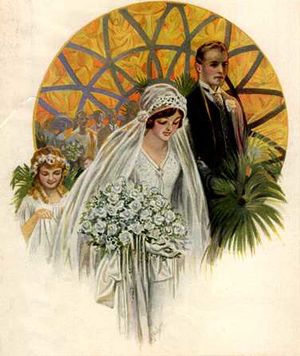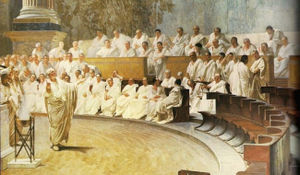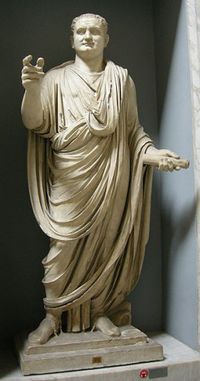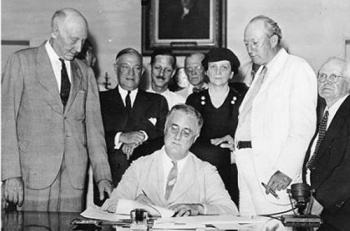Family

family as an institution of social bonds is under attack. First, by taking the responsibilities of the family members away and then by turning the roll of it's members against each other. To deny gender roles is to deny nature and nature's God who endowed us with certain rights. Those genders are not in opposition but are complimentory in order to create the foundation of a free society, the family.
The Family
A "Family" is the fundamental social group in society typically consisting of two parents and their children.
FAMILY, domestic relations. In a limited sense it signifies the father, mother, and children. In a more extensive sense it comprehends all the individuals who live under the authority of another, and includes the servants of the family. It is also employed to signify all the relations who descend from a common ancestor, or who spring from a common root. Louis. Code, art. 3522, No. 16; 9 Ves. 323.
2. In the construction of wills, the word family, when applied to personal property is synonymous with kindred, or relations. It may, nevertheless, be confined to particular relations by the context of the will, or may be enlarged by it, so that the expression may in some cases mean children, or next of kin, and in others, may even include relations by marriage. 1 Rop. on Leg. 115 1 Hov. Supp. 365, notes, 6 and 7; Brown v. Higgs; 4 Ves. 708; 2 Ves. jr. 110; 3 East, Rep. 172 5 Ves. 156 1,7 Ves. 255 S. 126. Vide article Legatee. See Dig. lib. 50, t. 16, 1. 195, s. 2.
- Bouvier's Law Dictionary, 1856 Edition
The family unit was a form of autonomous social corporate structure designed by the Law of Nature and natures God. In more ancient times consisted of the elder father, their married sons and their families but also including unmarried daughters and related family sibling groups that may have lost part of the two parent structure.
Families as autonomous units of society were often considered to be sacred but the authority within a family could also be compromised by the creation of central powers of more corporate forms of government.
The imperium[1] of some government forms originally consisted of the right to protect the family (merum) which was only outside its naturally established jurisdiction and could only be conferred by a lex curiata and became a from of the police power of the sword to turn the life of wicked men.
The shifting of authority from the natural Father and Mother of the family as a natural social unit not connected to the administration of government to a strictly civil relationship under the conscripted fathers of the State changes the nature of the union of marriage.
The power of governments originated in the power of he family which we see in the principles associated with the Patronus of Rome.
FAMILY BIBLE. A Bible containing an account of the births, marriages, and deaths of the members of a family.
- 2 An entry, by the father, made in a Bible, stating that Peter, his eldest son, was born in. lawful wedlock of Maria, his wife, at a time specified, is evidence to prove the legitimacy of Peter. 4 Campb. 401. But the entry, in order to be evidence, must be an original entry, and, when it is not so, the loss of the original must be proved before the copy can be received. 6 Serg. Rawle, 135. See 10 Watts, R. 82.
- Bouvier's Law Dictionary, 1856 Edition

Potestas
In a true government of the people, for and by the people - natural rights remain with the people.
Where the people remain in a “natural state”, under Natural Law, as God intended, before the creation of a “social contract”(whether implied or actual, defacto or dejure), the power of government remained with the individual. In this natural “state of society” the power of choice (liberty or right to choose), called the potestas,[2]remained with every man as the genius within the family.[3]
The Romans called this form of government libera res publica, which means free from things public. It is this phrase which is the origin of the Latin word republica. But over time the word developed two senses and uses. A Republic in one sense is “that form of government in which the administration of affairs is open to all the citizens. In another sense, it signifies the state, independently of its government.”[4]
In the latter sense we can envision a republic as a system where the people retain their rights, hold the power of the state and the ministers are titular servants of the people. In such systems taxes remain voluntary and it is every man’s responsibility to protect his neighbor as he would desire to be protected by his neighbor. What would hold such a society together as a nation? Are there examples of such a government anywhere in man's history?
There is a rich history of such governments and nations operating as diversified networks of voluntary systems of faith, hope, and charity. In fact, “our modern reliance on government to make law and establish order is not the historical norm.”[5]

: Religion was always what you did and do about the natural moral duty to God and your fellow man and Pure Religion was doing that without looking to the rulers of the world who are the conscripted fathers of the earth. You either take care of the needs of society through faith, hope, and charity or you do it through men who exercise authority one over the other through force, fear and violence. While the Father who art in heaven provides daily bread through charity and are the kingdom of God, the "fathers of the earth" uses force, taxation and intimidation etc and are the synagogue of Satan.[6]
Parens Patriae
Pater Patriae (plural Patres Patriae), also seen as Parens Patriae, is a Latin honorific meaning "Father of the Country", or more literally, "Father of the Fatherland".
- Parens patriae is Latin for "parent of the nation" (lit., "parent of the fatherland"). In law, it refers to the public policy power of the state to intervene against an abusive or negligent parent, legal guardian or informal caretaker, and to act as the parent of any child or individual who is in need of protection.
The Doctrine of Parens patriae is not just ancient doctrine but is found as a power of the modern state to control the activities of the people in Title 15, Commerce and Trade[7], Title 12, Banks And Banking[8], Title 18. Crimes And Criminal Procedure[9], Title 49. Transportation[10] and Title 42. Public Health and Welfare[11] of the United States Codes[12] and the laws of the several states.
- "In U.S. litigation, parens patriae can be invoked by the state to create its standing to sue; the state declares itself to be suing on behalf of its people." [13]
State of Nature
People in the state of nature before a social compact did not belong to the State. Their rights were protected by them or others who chose to do so in voluntary societies. The power of the state remained with the people individually from "generation to generation".[14]
King's bench
- "Parens patriae relates to a notion initially invoked by the King's Bench in the sixteenth century in cases of non compos mentis adults.[15] The notion dates from at least 1608, as recorded in Coke's Report of Calvin's Case, wherein it is said 'that moral law, honora patrem...doubtless doth extend to him that is pater patriœ.'" [16]
America supposedly threw off the king but so did Rome throw off the Tarquinian kings when it became a Republic. Rome did not remain a Republic nor did it citizens remain free.
We see the same idea of the State becoming the father of the people first awarded to Roman general Marcus Furius Camillus in 386 BC, who for his role in the aftermath of the Gallic siege of Rome was considered a second founder of the city, in succession to Romulus.
It was awarded to Julius Caesar, who as dictator became the de facto ruler of the Roman republic and its imperium, for having ended the civil wars.
Octavius was granted the titles of Augustus Caesar after another civil war started by the assassination of Julius Caesar. He began an increase in the welfare state of Rome until he was granted the title of Pater Patriae by a vote of the Senate in 2 BC.
The office did not add legitimacy to his legal powers like Imperator, Caesar, Augustus or Savior, princeps senatus, or even pontifex maximus and tribunicia potestas. But as the Patronus of the people it added popularity as a benefactor.
Augustus received this most prestigious title, the Pater Patriae, on February 5, 2 B.C.E. which was the Day of Concord on the Roman religious calendar.
In the Res Gestae, composed by Augustus himself, he wrote:
- “While I was administering my thirteenth consulship the senate and the equestrian order and the entire Roman people gave me the title Father of my Country.” Res Gestae, VI.35.
Romans and non-citizens swore oaths "at the altars of Augustus in the temples of Augustus in the various districts.”
He was called the Son of God and Savior of the people which explains the Christian conflict.
State Religion
These altars of their temples collected a tax to provide for the welfare of the people through tables at which Believers of The Way would tot eat.
Because religion was the way we care for the needy of society under the Caesars had become the [[Father of the people through his free bread.
The duties to their fellowman became public matter of the government welfare, public religion through forced offerings like the Corban of the Pharisees which made the word of God to none effect..
With Christians their practice of Pure Religion remained a private matter. It was in this distinction the Christian conflict with Rome brought persecution.
There were oaths of allegiance at the payment of taxes in the temples where benefits were also distributed. We can see these dainties recorded under Nero, Trajanus and others:
- “And I swear by the Emperor Nero Claudius Caesar Augustus that I have kept nothing back.” [17]
- “We swear by the fortune of the Emperor Caesar Trajanus Hadrian Augustus. ... under oath.” Lewis and Reinhold, Roman Civilization, II.387.
In Paphlagonia of north central Asia Minor there was an inscription dated in 3 B.C. which recorded an oath of obedient allegiance “taken by the inhabitants of Paphlagonia and the Roman businessmen dwelling among them.” [18]
In “ordered that a census be taken of each province everywhere and that all men be enrolled... all the peoples of the great nations took oath, and at the same time, through the participation in the census, were made apart of one society” [19]
Caesar today

The early Christians were bard from taking oaths by Christ's command to Swear not as a matter of doctrine and policy. But also they could not pray to the fathers of the earth for their daily bread, nor covet their neighbor's goods through men who called themselves benefactors but exercised authority.
In U.S. litigation, parens patriae can be invoked "as parens patriae on behalf of natural persons residing in such State"[20] by the state to create its standing to sue; the state declares itself to be suing on behalf of its people. For example, the Hart-Scott-Rodino Antitrust Improvement Act of 1976 (15 USC 15(c)), through Section 4C of the Clayton Act, permits state attorneys general to bring parens patriae suits on behalf of those injured by violations of the Sherman Antitrust Act.
The Applicability of parens patriae actions is affirmed in [15 U.S. Code § 15h - http://www.law.cornell.edu/uscode/text/15/15h] [21]
When the state becomes your Father offering you benefits at its table you become a child of the state and so do your children. The state becomes the ruling judge of your life when you eat at its table you will be required to sacrifice at its altars. Understanding this and who the Conscripted fathers of Rome were may shed new light on Jesus' statement "call no man upon the earth father."
This system in modern times and in ancient times of making the state your Father also included Birth_registration. This was just one part of the Social contract that binds people through an offer and acceptance of benefits. When these benefits are at the expense of your neighbor and through debt your neighbor's children and entangling bond is created.
In Rome at the time of Christ we know that "Although birth certificates have survived only in Egypt, literary references to such registrations prove the system operated throughout the empire." [22]
But like the Mark_of_the_Beast the real binding of ourselves is our faith or lack of it. Peter said we would make ourselves Merchandise through our covetousness. The antitheses of coveting is charity and sacrifice.
If people desire to be saved they need to believe but if they believe they will repent and began to live by faith and charity, caring about others as much as themselves.
That means gathering together in a living Network bound by love.
The living network is not just an email group but a convention of home Churches we call CORE bound by mutual sacrifice in the name of Christ. The COREs of the Church are connected through a network of Ministers of Record who see to bind the families of in free assemblies by love alone with one Father to pray to for our daily bread.
Those who have eyes to see will see.
Besides using the poor translation of 1 Corinthians 4:14-15 found in some Bibles [23] Clearly Paul never calls himself father of the people as Jesus used the word Pater or father as we see in Matthew 23:9 [24]
If people are willing to read Christ's statement in His own context they will see Him making the same references you see in the Luke 22 when Christ is again giving direct instructions about the "greatest among you shall be your servant" and "for one is your Master" or one is your Father who art in heaven.
Other wise you will make covenants with the gods many of the world
But the Modern Christian would make Caesar his master to obtain benefits at the expense of his neighbor through the exercising authority of his office and elect Caesars as their Benefactors.
Christ taught us to live by charity and the Perfect law of liberty not by forcing our neighbor to provide for us through any office of authority.
The Church use to do that but now they appear to be there just to make people comfortable in their iniquity and sins of wanton covetousness. The modern Christian is again entangled in the elements of the "world" as Peter warned us in 2 Peter 2:20 "For if after they have escaped the pollutions of the world through the knowledge of the Lord and Saviour Jesus Christ, they are again entangled therein, and overcome, the latter end is worse with them than the beginning."
Such people should expect a collapse of their nations worse than the fall of Rome and the sooner they repent the better off they will be.
This is undeniable even though Christ said to be in the "world" and not of it using the same word primarily defined as constitutional order and government.
Where John the Baptist preached charity the Modern Christians lives a socialist life of token charity depending on their masters, the fathers of the earth, for their daily bread, binding themselves with oaths in order to eat at the table of kings (see Proverbs 23). They must now bow down and serve them but it does not mean they should eat at those tables.
We know those tables are a snare and a trap.
But many who say they believe are actually workers of iniquity taking a socialist bite out of their neighbors and devouring one another in their lust for benefits ... driving their nation and the whole "world" into debt while cursing their children with that debt because they do not really want to gather in the "name of Christ".
They love the "world" and its false securities and disregard the words of Christ's prophets in 1 John 2:15 -18 according to their own "sloppy" doctrines and private interpretations.
The Modern Christian does not really love Christ but an image of Christ he creates in his own mind. Oh he says he believe and that he loves the Lord but does not do what he said. In truth he loves the "world" and the "things [that are] in the world" and we know that "If any man love the world, the love of the Father is not in him."
Fathers |
Conscripted fathers |
Pater Patriae |
Patronus |
Emperator |
Potestas |
Imperium |
Genius |
Protection |
Authority |
Benefactors |
Rome vs US |
Polybius |
Plutarch |
Nimrod |
Senate |
Was Jesus a socialist |
Christian conflict |
Public religion |
Covetous Practices |
Imperial Cult of Rome |
Divide |
Biting one another |
Legal charity |
Cry out |
Social bonds |
Pure Religion |
Charitable Practices |
Corban |
Hear |
Merchandise |
Curse children |
Birth registration |
Undocumented |
Bondage |
Gods |
Apotheos |
Supreme being |
Mark of the Beast |
Nature of the Beast
Elements |
Perfect law of liberty |
The Way |
Lady Godiva |
Network |
If you need help:
- Or want to help others:
Join The Living Network of The Companies of Ten
The Living Network |
Join Local group |
About |
Purpose |
Guidelines |
Network Removal
Contact Minister |
Fractal Network |
Audacity of Hope |
Network Links
Law
Law |
Natural Law |
Legal title |
Common Law |
Fiction of law |
Stare decisis |
Jury |
Voir dire |
Consent |
Contract |
Parental contract |
Government |
Civil law |
Civil Rights |
Civil Government |
Governments |
No Kings |
Canon law |
Cities of refuge |
Levites |
Citizen |
Equity |
The Ten Laws |
Law of the Maat |
Bastiat's The Law and Two Trees |
Trees |
The Occupy Refuge Movement |
Clive Bundy |
Hammond |
Barcroft |
Benefactors |
Gods |
Jury |
Sanhedrin |
Protection |
Weightier matters |
Social contract |
Community Law |
Perfect law of liberty |
Power to change |
Covet |
Rights |
Anarchist |
Agorism |
Live as if the state does not exist |
Footnotes
- ↑ IMPERIUM. (Gaius, IV.103), when making a division of judicia into those Quae Legitimo jure consistunt, and those Quae Imperio continentur, observes that the latter are so called because they continue in force during the Imperium of him who has granted them. "gladii potestatem ad anim advertendum in facinorosos homines men," Ulpian, în D, 2, 1, 3; Gaius definește imperium merum ca fiind. William Smith, D.C.L., LL.D.: A Dictionary of Greek and Roman Antiquities, John Murray, London, 1875. Imperium
- ↑ Potestas, in the law of the Latins, "signifies generally a power or faculty" of authority by which we do anything." Patria Potestas originally signified the authority which a father had over of his children, grandchildren, and other descendants. When this right or power was eventually vested in the State the agency of government became the father of the people and this not only weakened the people but reduced their liberty. See Parens Patriae or "Call no man Father".
- ↑ Leviticus 25:10 “And ye shall hallow the fiftieth year, and proclaim liberty throughout [all] the land unto all the inhabitants thereof: it shall be a jubile unto you; and ye shall return every man unto his possession, and ye shall return every man unto his family.”
- ↑ Republic. Black’s Dictionary 3rd Ed. p1536.
- ↑ Part I of The Enterprise of Law : Justice without the State by Dr. Bruce L. Benson.
- ↑ Revelation 2:9 I know thy works, and tribulation, and poverty, (but thou art rich) and I know the blasphemy of them which say they are Jews, and are not, but are the synagogue of Satan.
: Revelation 3:9 Behold, I will make them of the synagogue of Satan, which say they are Jews, and are not, but do lie; behold, I will make them to come and worship before thy feet, and to know that I have loved thee.[Today this would include those who say they are Christians but doeth contrary to the word. - ↑ 15 U.S. Code § 15 Applicability of parens patriae actions § 15h. Applicability of parens patriae actions Sections 15c, 15d, 15e, 15f, and 15g of this title shall apply in any State...
- ↑ Title 12. Banks And Banking, Chapter 53. "the State, as parens patriae, may bring a civil action on behalf of its residents in an appropriate district court...
- ↑ Title 18. Crimes And Criminal Procedure, Part I. Crimes, Chapter 77. Peonage, Slavery, And Trafficking, In Persons, Section 1595. Civil Remedy adversely affected by any person who violates section 1591, the attorney general of the State, as parens patriae, may bring a civil action against such person on behalf of the residents of the State...
- ↑ Title 49. TRANSPORTATION, ...the attorney general of the state may, as parens patriae,” for “a State authority may”...
- ↑ Title 42. THE PUBLIC HEALTH AND WELFARE, Chapter 7. SOCIAL SECURITY... residents of that State has been or is threatened or adversely affected by any person who violates a provision of this part, the attorney general of the State, as parens patriae, may bring...
- ↑ Search parens patriae at https://www.law.cornell.edu/uscode/text/searchResultsForm.html
- ↑ [1]
- ↑ Daniel 4:3 How great [are] his signs! and how mighty [are] his wonders! his kingdom [is] an everlasting kingdom, and his dominion [is] from generation to generation.
Joel 3:20 But Judah shall dwell for ever, and Jerusalem from generation to generation - ↑ Lat: not having control over the mind or intellect. Not of sound mind; insane. See 108 A. 2d 820, 822. In certain circumstances its effect is lessened to mean only "not legally competent." See 1 S.E. 2d 768, 770. Compare diminished capacity; incompetent; non sui juris .
- ↑ [2]
- ↑ Lewis and Reinhold, Roman Civilization, 388.
- ↑ Lewis and Reinhold, Roman Civilization, II.34–35.
- ↑ Paulus Orosius, historian and theologian in the 5th century, VI.22 and VII.2.
- ↑ http://www.law.cornell.edu/uscode/text/15/15c
- ↑ 15 U.S. Code § 15h "Sections 15c, 15d, 15e, 15f, and 15g of this title shall apply in any State, unless such State provides by law for its nonapplicability in such State. "
- ↑ Imperial Ideology and Provincial Loyalty in the Roman Empire By Clifford Ando, page 355.
- ↑ "For I became your father in Christ Jesus through the gospel." The King James renders a more accurate translation:
- 14 I write not these things to shame you, but as my beloved sons I warn you.
- 15 For though ye have ten thousand instructors in Christ, yet have ye not many fathers: for in Christ Jesus I have begotten you through the gospel. [1 Corinthians 4].
- ↑ Matthew 23:9 "And call no [man] your father upon the earth: for one is your Father, which is in heaven."